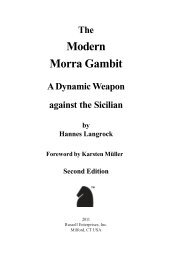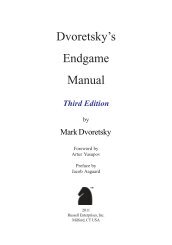Lenin, Trotsky, Germany and the Treaty of Brest-Litovsk The ...
Lenin, Trotsky, Germany and the Treaty of Brest-Litovsk The ...
Lenin, Trotsky, Germany and the Treaty of Brest-Litovsk The ...
You also want an ePaper? Increase the reach of your titles
YUMPU automatically turns print PDFs into web optimized ePapers that Google loves.
IntroductionThis book is devoted to <strong>the</strong> history <strong>of</strong> <strong>the</strong> <strong>Treaty</strong> <strong>of</strong> <strong>Brest</strong>-<strong>Litovsk</strong>, signed onMarch 3, 1918 by <strong>the</strong> Soviet government <strong>and</strong> <strong>the</strong> Central Powers 1 . In all <strong>of</strong> Sovietforeign policy, <strong>the</strong>re was probably no agreement more fragile than this one: lastingfor slightly more than nine months, <strong>the</strong> <strong>Brest</strong>-<strong>Litovsk</strong> treaty was annulled by<strong>the</strong> German <strong>and</strong> Soviet governments, <strong>and</strong> subsequently, following <strong>Germany</strong>’scapitulation in World War I, also repealed by <strong>the</strong> 116th article <strong>of</strong> <strong>the</strong> <strong>Treaty</strong> <strong>of</strong>Versailles. Nonchalantly characterized as a “respite” by Vladimir <strong>Lenin</strong>, <strong>the</strong> agreementmet with criticism <strong>and</strong> resistance from an overwhelming majority <strong>of</strong> revolutionaries,on <strong>the</strong> one h<strong>and</strong>, <strong>and</strong> <strong>of</strong> Russian patriots, on <strong>the</strong> o<strong>the</strong>r. <strong>The</strong> former claimedthat <strong>the</strong> <strong>Treaty</strong> <strong>of</strong> <strong>Brest</strong>-<strong>Litovsk</strong> was a stab in <strong>the</strong> back <strong>of</strong> <strong>the</strong> German revolution.<strong>The</strong> latter called it a betrayal <strong>of</strong> Russia <strong>and</strong> its allies. Both were, in <strong>the</strong>ir own way,correct. However, for reasons that no one could fathom, <strong>Lenin</strong> insisted on <strong>the</strong><strong>Treaty</strong> <strong>of</strong> <strong>Brest</strong>-<strong>Litovsk</strong> <strong>and</strong> finally saw it ratified.<strong>The</strong> evolution <strong>of</strong> <strong>Lenin</strong>’s views after he came to power in November 1917*, <strong>and</strong><strong>the</strong> aims that <strong>Lenin</strong> set for himself before <strong>and</strong> after <strong>the</strong> takeover, are crucial issuesfor <strong>the</strong> study <strong>of</strong> <strong>the</strong> history <strong>of</strong> <strong>the</strong> <strong>Treaty</strong> <strong>of</strong> <strong>Brest</strong>-<strong>Litovsk</strong> – <strong>and</strong> crucial issues, aswell, for <strong>the</strong> history <strong>of</strong> <strong>the</strong> world revolution. It would be a mistake to believe that<strong>Lenin</strong>’s views changed with changing circumstances. It would be more correct tosuppose that in any situation he found <strong>the</strong> best means <strong>of</strong> achieving his goals. <strong>The</strong>claim can be made that <strong>Lenin</strong>’s whole adult life was devoted to struggle – <strong>and</strong>beginning around 1903, to a struggle for power. It would be difficult to say whe<strong>the</strong>rhe needed power in order to secure victory for <strong>the</strong> revolution or whe<strong>the</strong>r <strong>the</strong>revolution was for him a means to obtain power.Since until 1917 <strong>Germany</strong> appeared to be <strong>the</strong> leader <strong>of</strong> <strong>the</strong> revolutionary movement—itsSocial Democratic Party was <strong>the</strong> most powerful in <strong>the</strong> world – a worldrevolution naturally presupposed a revolution in <strong>Germany</strong>. <strong>The</strong> revolution did——————————————————* Until February 1, 1918, Russia was on <strong>the</strong> Julian calendar, which differed by 13days from <strong>the</strong> Gregorian calendar used in Western Europe. Thus, <strong>the</strong> Bolshevikcoup, which took place on October 25 according to <strong>the</strong> Russian calendar, happenedon November 7 according to <strong>the</strong> Gregorian calendar. Consequently, in Russia<strong>the</strong> Bolshevik Revolution is called <strong>the</strong> October Revolution, while in WesternEurope it is known as <strong>the</strong> November Revolution. On January 26, 1918, <strong>the</strong> Sovietgovernment <strong>of</strong>ficially announced a transition to <strong>the</strong> Gregorian calendar, <strong>and</strong> February1 in <strong>the</strong> Old Style became February 14 in <strong>the</strong> New Style. Trying to minimize<strong>the</strong> confusion that inevitably arises when Russian historical dates prior toFebruary 1 (14), 1918 are mentioned, historians in Russia <strong>of</strong>ten gave both datesor specified whe<strong>the</strong>r a date was given in <strong>the</strong> Old Style (O.S.) or <strong>the</strong> New Style(N.S.). In <strong>the</strong> present publication, all dates are given in <strong>the</strong> New Style, accordingto <strong>the</strong> Gregorian calendar.5








